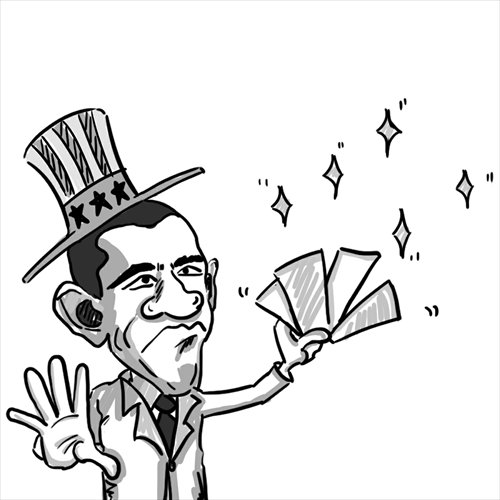HOME >> BUSINESS
Political agenda of TPP could provoke trouble
By Geoffrey Murray Source:Global Times Published: 2014-2-18 21:03:01

Illustration: Chen Xia/GT
It's official: the US-promoted trade pact known as the Trans-Pacific Partnership (TPP) is indeed part of Washington's political strategy to cope with China.
The Wall Street Journal reported US Vice President Joe Biden, acknowledging congressional skepticism, defended the proposed 12-nation agreement as an "important counterweight to China."
It quoted participants at a retreat of Democratic lawmakers as saying Biden insisted the pact had economic and strategic value, so should be supported.
While slowly making progress among target nations in Southeast Asia and the South Pacific in gaining signatories, President Obama is having trouble at home, especially within the labor unions, traditionally a base of Democratic Party support.
Nothing daunted, he has ambitions to sign a similar trade agreement with the European Union (EU), known as the Trans-Atlantic Partnership Agreement (TAPA).
Some fanciful critics in Europe see the two initiatives as an attempt by Obama to create a "World Government" with him at the head.
There might be something in this. As far as the TPP is concerned, the respected Foreign Policy magazine recently published a thoughtful analysis quoting administration sources as saying the pact was a "critical strategic leadership initiative" for the US.
The argument seems to be that the world is losing faith in Obama's and America's leadership. The TPP would be an unarguable demonstration of American leadership, and its indispensable role in the world; failure would confirm everyone's worst fears.
Looking back over the history of the past 60-odd years, there have been a number of US-led attempts to counter China - whether economically, militarily or politically - yet the organizations (regional alliances) set up for this purpose have long since been consigned to the history books.
Admittedly, the TPP has a better reason for existence if it focuses on promoting the flow of trade and investment around the region and creating greater economic stability. However, if China is excluded from membership (as it is for the moment), it could still be seen on the mainland as a form of attempted encirclement.
Yet, China's central leaders may not have to worry too much, as there's plenty of troublesome issues to be settled before the wide-ranging trade pact swings into action.
The Obama Administration tries to talk up the deal as smashing protectionism in trade and investment and keeping governments at arms length. Funnily enough, the biggest obstacle to an agreement actually lies in Washington.
As the Foreign Policy analysis points out, apart from Vietnam, all targeted members are straightforward parliamentary democracies, so, in theory, a simple majority vote would get the job done; US politics don't work like that, and congressional backs initially went up after President Obama sought approval for "fast-track approval," suggesting Capitol Hill was to be bypassed in the rush to put the TPP in place.
The central claim of opponents in the union movement is that the pact would destroy American jobs and force down wages, which it alleges has happened since its predecessor, the North American Free Trade Agreement (NAFTA) - with Canada and Mexico - came into force two decades ago.
Of course, free trade with low-wage countries could indeed challenge directly competing American industries (already reeling from competition with China).
However, several TPP "members" are high-wage countries (Australia, Canada, Japan and Singapore) so that isn't such a compelling argument. Actually, US industry could benefit by gaining greater access to markets in countries with relatively "closed" economies, Japan being a notorious example.
Potentially, there are a lot of good things in the TPP. On the trade and investment side, it will certainly eliminate tariffs not just in commodities but also in services (banking and insurance). It also offers a chance to provide more protection on copyright and patents and in the labor and environmental fields.
The big worry is that, with the US in the leading role, it starts getting too political - ending up in a confrontational rather than a cooperative role with an increasingly powerful China.
Meanwhile, what of the TAPA? The idea has only come to the fore in the last year or two and that may not be good timing when one considers the mess into which the EU has got itself.
Europe is still trying to sort out the aftermath of the financial crisis that saw several countries teeter on the brink of bankruptcy. There's a two-tier and perhaps even a three-tier EU at present, so a TPP-style deal might be difficult right now.
The author is a lecturer with China Foreign Affairs University. bizopinion@globaltimes.com.cn
Posted in: Comments